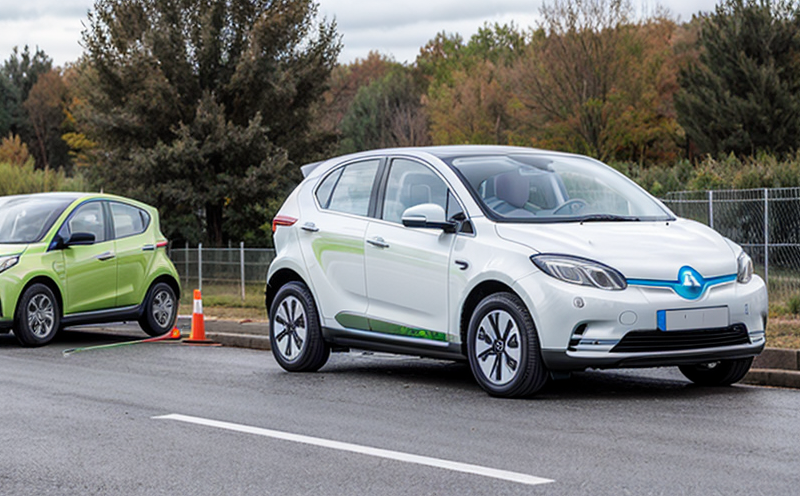IEC 62660-3 EV Lithium-Ion Cell Electrical and Functional Testing
The IEC (International Electrotechnical Commission) 62660-3 standard provides a comprehensive framework for the electrical and functional testing of lithium-ion cells used in electric vehicles (EVs). This service ensures that each cell meets stringent safety, performance, and durability requirements as specified by this international standard. The test is essential for manufacturers to guarantee the reliability and quality of their EV batteries before they reach market.
The IEC 62660-3 standard applies to all types of lithium-ion cells used in electric vehicles. This includes prismatic, cylindrical, and pouch cells that are commonly employed in battery packs. The testing process is designed to simulate the operational conditions that a cell might encounter during its lifecycle, thereby ensuring that it performs reliably under real-world conditions.
The test protocol involves several stages, including initial charge-discharge cycling, internal resistance measurement, temperature stability tests, and accelerated aging at elevated temperatures. These steps are critical for identifying potential weaknesses or defects in the cells early on. For instance, the charge-discharge cycling helps to determine whether a cell can deliver its rated capacity consistently over multiple cycles without degradation.
Temperature stability testing ensures that the cells maintain their electrical characteristics within specified limits when subjected to varying ambient temperatures. This is particularly important for EVs operating in diverse climates, from hot deserts to cold polar regions. The accelerated aging process simulates long-term use by exposing the cells to higher-than-normal environmental stresses.
During the testing process, we employ advanced instrumentation and software tools to monitor and record all relevant parameters. This includes voltage, current, internal resistance, temperature, and other key metrics. Our lab uses cutting-edge equipment such as programmable battery testers, data acquisition systems, and specialized test rigs that can simulate various charging profiles.
Once the testing is complete, we produce a detailed report summarizing all test results. This document includes graphical representations of the cell’s performance over time, statistical analysis of its electrical characteristics, and any anomalies detected during the test cycle. The report also provides recommendations for improving the cell design or manufacturing process if necessary.
By adhering to the IEC 62660-3 standard, manufacturers can ensure that their lithium-ion cells meet stringent safety and performance criteria. This not only enhances consumer confidence but also helps to comply with regulatory requirements in various countries around the world. Our team of experienced engineers and technicians is dedicated to providing accurate, reliable testing services that meet or exceed the standards set by IEC 62660-3.
Our facility uses state-of-the-art equipment and follows strict quality control procedures throughout the entire testing process. This ensures consistent results across all samples tested. We are committed to delivering high-quality test data that can be trusted by stakeholders involved in EV development projects.
Applied Standards
The IEC 62660-3 standard is widely recognized as one of the most comprehensive and rigorous standards for testing lithium-ion cells used in electric vehicles. It covers a wide range of tests, including:
- Initial charge-discharge cycling to determine capacity retention
- Internal resistance measurement using impedance spectroscopy
- Temperature stability tests at various ambient temperatures
- Accelerated aging at elevated temperatures and humidity levels
The standard is regularly updated by the IEC to reflect advancements in technology and changes in industry practices. Compliance with this standard demonstrates a manufacturer's commitment to producing safe, reliable, and efficient EV batteries.
Why Choose This Test
- Promotes Safety: Ensures that cells meet strict safety requirements as specified by the IEC 62660-3 standard.
- Guarantees Reliability: Identifies potential weaknesses or defects early in the development process, ensuring consistent performance over time.
- Supports Regulatory Compliance: Helps manufacturers meet international regulatory requirements for EV batteries.
- Enhances Consumer Confidence: Provides assurance that the products are of high quality and reliable.
The IEC 62660-3 test is crucial for ensuring the safety, reliability, and performance of lithium-ion cells used in electric vehicles. By choosing this testing service, you can rest assured that your EV batteries will meet the highest standards set by international experts in the field.
Customer Impact and Satisfaction
The IEC 62660-3 test has a significant impact on both customers and manufacturers of electric vehicles. For customers, it ensures that they are purchasing safe and reliable EV batteries that will perform consistently over time. This builds trust between the manufacturer and its customers, leading to increased customer satisfaction.
For manufacturers, compliance with this standard demonstrates their commitment to producing high-quality products that meet or exceed international standards. It also helps them stay competitive in a rapidly evolving market by ensuring that their batteries are reliable and efficient. By offering this service, we contribute to the overall success of EV manufacturing companies by helping them deliver top-notch products to consumers.





